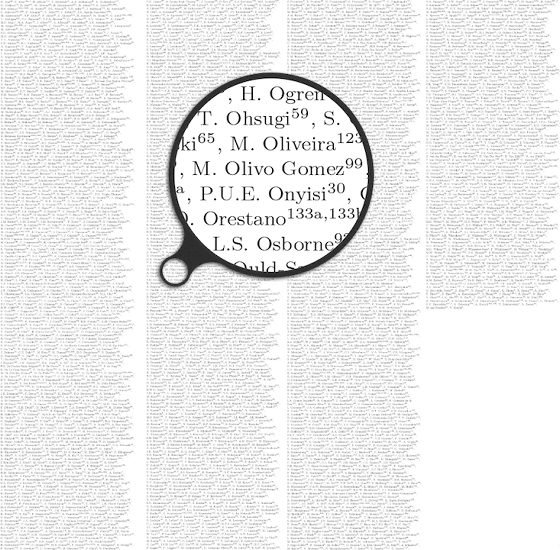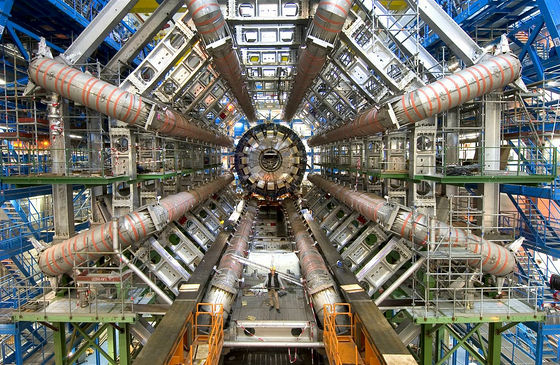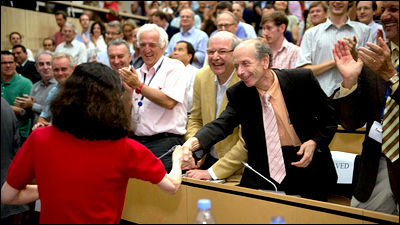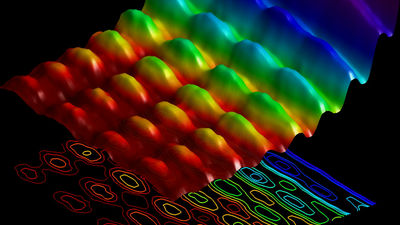Who is the "genius" who truly discovered Higgs particles?

In 2012Higgs particleNew particles found to be found, the theoretical physicist from which the name was derivedPeter HiggsProfessor received the Nobel Prize in Physics in 2013. Higgs particles were repeatedly experimented with CERN's large hasron collision type accelerator, and it was discovered, but, like Einstein who derived the theory of relativity, who was "genius" in Higgs' particle discovery Of? About that,NautilusMr. Neil Hartmann is conducting an investigation.
Who Really Found the Higgs Boson
http://nautil.us/issue/18/genius/who-really-found-the-higgs-boson
First of all, a candidate for genius is Peter Higgs, a theoretical physicist in the UK who is also the source of the name. Professor HiggsIn 1964, we submitted a theory of symmetry breaking in electric weak theory explaining the "mass origin" of elementary particlesIn 2013Francois AnglaisI won the Nobel Prize for Physics Prior to my professor.
However, an experiment group of CERN's large hadron collision type accelerator "ATLAS Experiment"Professor Higgs, Professor Anglère and Professor Robert Blount who studied with Professor Anglère also said that Einstein had derived Einstein's theory of relativity, according to the explanation of Mr. Peter Jeni, He did not believe he had accomplished his accomplishment. Einstein solved a problem in a certain field and showed a whole new perspective, but for Professor Higgs, he says, "I was studying only for a few weeks."

So who was the genius? So Mr. Hartman said to CERN's experiment team "a genius leader who led the field where thousands of engineers and physicists have spent over thirty years, receiving a multi-billion dollar equity investment" I think that. However, Fabiola Gianotti, the project leader of ATLAS Experiment, denied the idea of "a genius of just one scientist." Although breakthrough in science seems to have been brought about by a single genius at first glance, in a modern science where various people and organizations collaborate, the view of such things is not right.
In the ATLAS collaborative research, almost all decisions must be approved by group representatives such as the Institute Board of Directors and the Joint Research Board. There is a leader called "spokesperson" in the project, but since "agreement" is important, it is a mechanism that can not be ordered with the existence of a spokesperson.
One of the reasons that it is important to be a group in the ATLAS Experiment is "to not produce a single star". There are 3000 authors on ATLAS research papers, and there are only a few authors name lists. In the paper published in 2010, 10 pages out of 40 pages were authors' name list.

And another reason that groupiness is important is to prevent bias in data interpretation. Other attempts to avoid bias are made, for example, in order that the physicists do not intentionally adjust the analysis tools, the algorithms and software are adjusted first, and then the raw data is used last It is getting. In addition, all analyzes are checked by several scientists. Collectiveness becomes important in order not to produce "lie result" that does not actually exist.
As a device for observing particle trajectoriesFoam boxCompared to the era in which it was used, the modern large hasron collision type accelerator which observes the collision of elementary particles has become a very complicated mechanism. Therefore, even when conducting one experiment, it is necessary to have several experts with knowledge of various detectors inside the instrument. Depending on the threshold setting of subsystem equipment etc., a numerical value different from actual data seems like facts, so it is most difficult to work out what understands what causes failure, and each person demonstrates his / her ability It becomes a point.
Also, it is necessary to change detectors due to changes in the times and damage caused by radiation, and the working process also changes accordingly. The complication of work is also one reason why people need hands. Even a relatively simple analysis involves 100 physicists, and as far as the whole Higgs analysis is concerned, a team of over 600 physicists went there.
In this way, the expansion of the research scale and the complexity of the work are creating anonymity in one discovery. And anonymity was institutionalized in the culture of ATLAS. According to Marumi Kado, who led the final analysis in Higgs' particle discovery in the interview, because there is no culture where only one person becomes prominent, "The final analysis is extremely simple, what matters is how to construct the detector, How to adjust the equipment, and how well it was designed in the early stages, it took 25 years to complete all of them. "Credit to yourself Instead, I talked about the achievements of other groups.

The model of collaborative research at ATLAS shows that "In order to be innovative in physics and engineering, it is necessary to make the structure of corporate culture and management innovative."
International Management Development InstituteProfessor Donald Marshan conducted case studies in ATLAS in the 2000s and discovered that there is no official "authority" in ATLAS management. Generally, collaborative work occurring at work does not have a direct relationship with your work, do it for "someone" who decides salary. But in the case of ATLAS, for example in the case of construction work, the project leader of the ATLAS pixel detector works for an American research institution in California, and the engineer, a direct subordinate of the project leader, work for an Italian institution I will. In doing so, the project leader plays an important role in the manufacturing process, but it does not have the power to promote, punish, or evaluate performance. What is done between your boss and his / her subordinates is discussion, negotiation, compromise, etc. There is a sense that "work for someone" rather than "work for someone".
As a result, a very flexible and efficient management structure is completed. In a study that Professor Marshan studied about the performance of various organizations, ATLAS is a benchmark that measured the point of "how much information is controlled", "whether information can be diffused" or "whether information can be capitalized" He said that he had recorded a score of 5%. Professor Marshan also says that the management structure of ATLAS is better when it adapts to changing circumstances or temporary changes. According to Professor Marshan, these cultures were not accidentally born, but they are derived from the fact that the founder solved the ethics of collaborative work for each member.
According to Mr. Hartman's investigation, it seems that the individual "genius" as an individual could not be found in ATLAS or other experiment team of CERN. Beyond the theoretical physicist and the founder of the experiment program, "working together" itself was equipped with the genius qualities of "imagination" "persistence" "open way of thinking" "performance".

Gianotti said that "96% of the universe is darkness, what it is made from, what it is made of, How it interferes with our instruments remains a mystery, there is no clue to elucidation, that is, there is still much room for genius to appear. " However, the "genius for elucidating the mystery" that will emerge in the future is "collective" where thousands of people cooperated, and there is a high possibility that it is not one such person like Einstein It seems to be high.
Related Posts:
in Science, Posted by darkhorse_log







